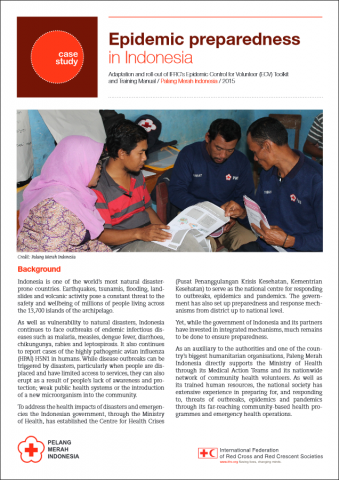Epidemic Preparedness in Indonesia


Indonesia is one of the world’s most natural disaster- prone countries. Earthquakes, tsunamis, flooding, landslides and volcanic activity pose a constant threat to the safety and wellbeing of millions of people living across the 13,700 islands of the archipelago As well as vulnerability to natural disasters, Indonesia continues to face outbreaks of endemic infectious diseases such as malaria, measles, dengue fever, diarrhoea, chikungunya, rabies and leptospirosis. It also continues to report cases of the highly pathogenic avian influenza (HPAI) H5N1 in humans. While disease outbreaks can be triggered by disasters, particularly when people are displaced and have limited access to services, they can also erupt as a result of people’s lack of awareness and protection; weak public health systems or the introduction of a new microorganism into the community. To address the health impacts of disasters and emergencies the Indonesian government, through the Ministry of Health, has established the Centre for Health Crises (Pusat Penanggulangan Krisis Kesehatan, Kementrian Kesehatan) to serve as the national center for responding to outbreaks, epidemics and pandemics. The government has also set up preparedness and response mechanisms from district up to national level.
Pelang Merah Indonesia, IFRC, 2015
Online version of the report
http://ifrc.org/Global/Publications/Health/ECV%20Case%20Study%20Indonesia.pdf
